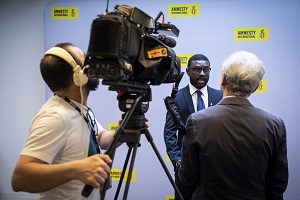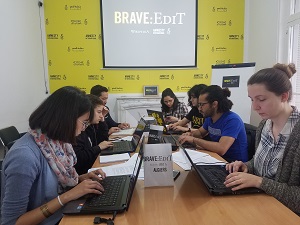Amnesty International To Create Human Rights Archive
|
|
Amnesty International Activists protest against President Donald Trump's immigration policiesPhoto by Amnesty International USA |
Nonprofit human rights organization Amnesty International has chosen digital preservation company Preservica to create a global digital archive that will allow Amnesty to migrate, preserve, and provide access to more than half a century’s worth of records. The cloud-based archive will hold digitized and born-digital materials and will ingest records going forward from the organization’s SharePoint system.
Amnesty has been drawing attention to human rights abuses and advocating for international laws and standards around the world since 1961, and it was awarded the 1977 Nobel Peace Prize for "defense of human dignity against torture." Its International Secretariat in London administers the organization’s daily affairs and holds a significant archive of records collected as evidence in human rights violations cases. These comprise paper-based, digitized, and born-digital records including 1962 documents from anti-apartheid leader Nelson Mandela’s trial in Pretoria, South Africa; materials supporting Amnesty’s “Stop Violence Against Women” campaign, founded in 2004; research; case files; public statements; mission notes; testimonies taken in the field; submissions to the United Nations; audiovisual resources; newsletters; annual reports; crowdsourced materials; and administrative documents.
PLANNING FOR THE LONG HAUL
|
|
Death Sentences and Executions 2017 - Amnesty International Global Report LaunchPhoto by Amnesty International |
While the organization has digitized some material over the past few years, and deposits publicly available content with the International Institute of Social History (ISH), a mass digitization program is still on the horizon and will require a secure repository. Newer recordings and testimonies, YouTube videos, correspondence, and satellite imagery used by Amnesty are increasingly produced and accessed in exclusively digital format. Records that often contain highly sensitive material need to be shared efficiently among up to 700 people across 20 international offices. In addition, several of Amnesty’s recent initiatives produce large volumes of crowdsourced data, which need to be preserved for future access.
“We knew how to produce outputs, how to publish things to our website, how to disseminate information,” Amnesty International archivist Bryony Hooper told LJ. “But we weren't quite there on how to manage this information, preserve it long-term, and make it permanently accessible.”
Hooper began gathering requirements from Amnesty staff and stakeholders in January, and by April, the organization was comparing quotes. Amnesty uses SharePoint, a web-based document storage system compatible with Microsoft software, to manage its internal records, and maintains an extensive data catalog. Hooper wanted a single storage preservation platform that would integrate with all its asset management systems and seamlessly ingest new material in the future, with an eye toward flexibility when dealing with potential new formats. “Preservica ticked all the boxes,” she told LJ.
Preservica provides digital preservation services for archives, libraries, museums, government organizations, and businesses around the world, including the Yale University and Dartmouth College libraries, Texas State Library and Archives, UK National Archives, more than 20 U.S. state archives, and the Legal Information Preservation Alliance, a consortium of over 100 academic, federal, state, and public law libraries.
Because the company has worked closely with its user community to meet a wide range of preservation needs, Preservica has been able to move quickly, providing Amnesty with an essentially out-of-the-box solution hosted on its Enterprise Private Cloud platform. “We're not building a bespoke application,” Preservica marketing director Michael Hope told LJ. “They're taking our product, which has been developed and shaped by our user community of archivists and librarians over the last ten, 15 years, so it's well suited to what [Hooper is] trying to achieve.”
Preservica’s private cloud-based storage maintains multiple backups that can communicate with each other, so the loss of data integrity in any one server system can be quickly restored. And the ingestion process, once set up, will be largely automated. "We wanted a solution that had the capability of doing all the things we need it to do,” said Hooper, “ingest, preserve, store, migrate—all those bits rolled into one package, so it was less of a manual process." Among other efficiencies, it will mean that information transfer can be automated within different time zones across the globe without the need to wait on Hooper, in London, as gatekeeper. The new platform will also enable the ongoing transfer of information to ISH.
As much of Amnesty’s data is centered on human rights, security is a major consideration. "Part of what we're looking to do at Amnesty International is to take information off their Sharepoint environment, where it's susceptible to corruption or deletion or alteration, and bring it into a more secure environment,” noted Preservica marketing director Michael Hope.
Access to material in the new archive will also have granular controls, noted Hooper. Content might be restricted, she said, not only “because it contains sensitive information, but [because] it also might contain information that we don't want to have jumping up on your screen—some of the content is quite challenging."
Another major concern, said Hooper, will be ensuring that descriptive and technical metadata in a number of languages—and alphabets—from Amnesty’s existing catalog is preserved.
THE CROWD IN THE CLOUD
|
|
#BraveEdit in AlgeriaPhoto by Amnesty International |
In addition to producing its own records, Amnesty relies on a large amount of data from social media for its research. The organization has launched several initiatives in the past years, such as Amnesty Decoders, a platform that uses crowdsourcing to help researchers sift through datasets and online content. Volunteers can register for projects such as Troll Patrol, which analyzed a representative sample of tweets sent to 1,000 women politicians and journalists over a year’s time, to help uncover patterns of sexist and racist abuse.
The results were compiled in Amnesty’s 2018 #ToxicTwitter report, which called on the platform’s administration to step up and check such abuse. The 2016 Decode Darfur project invited participants to compare satellite images of villages in Darfur over time to identify the destruction of villages by the Sudanese government. More than 28,000 volunteers from 147 countries helped analyze 326,000 square kilometers of imagery.
Another initiative, Amnesty’s Digital Verification Corps, asks a network of student volunteers from human rights centers at the University of California, Berkeley, in the United States; the University of Essex in the UK; the University of Pretoria in South Africa; and the University of Toronto, in Ontario, Canada, to vet online data. Amnesty experts train them in methodologies for evaluating the authenticity, location, and time of photos and videos from social media that are used as evidence in human rights cases—data that also requires storage.
Amnesty has been investigating ways to develop human rights principles for artificial intelligence (AI) systems as well. In his address at the 2017 AI for Good Global Summit at the International Telecommunication Union (ITU) in Geneva, Switzerland, Amnesty secretary general Salil Shetty noted that there could be a place for ethical AI innovations in Amnesty’s work toward health care, education, and workplace rights. “In the future,” he said, “we could have artificial intelligence systems that detect and correct bias in data, rather than doubling down on human bias; we have automation that takes people out of dangerous and degrading jobs, but also educational and economic policies that create opportunities for dignified and fulfilling jobs.”
The public face of the digital archive could also provide an opportunity for data mining and big data research in the future, said Hooper. "If we're going to say this has enduring value, I've got to make sure it's going to be permanently preserved.”
Staff have been involved in the process as well, Hooper noted. "It's been quite reassuring to see the interest from internal staff, and their understanding of the need for permanent preservation of content that they're using,” Hooper told LJ. “They realize…that there's a lot more involved in information management than just saving it in a drive somewhere. So it's actually been quite heartening to see the interest in the organization."
Amnesty and Preservica are currently conducting functionality testing, and they hope to have the public access side of the organization’s catalog available by late spring 2019.
ALREADY A SUBSCRIBER? LOG IN
We are currently offering this content for free. Sign up now to activate your personal profile, where you can save articles for future viewing












Add Comment :-
Comment Policy:
Comment should not be empty !!!